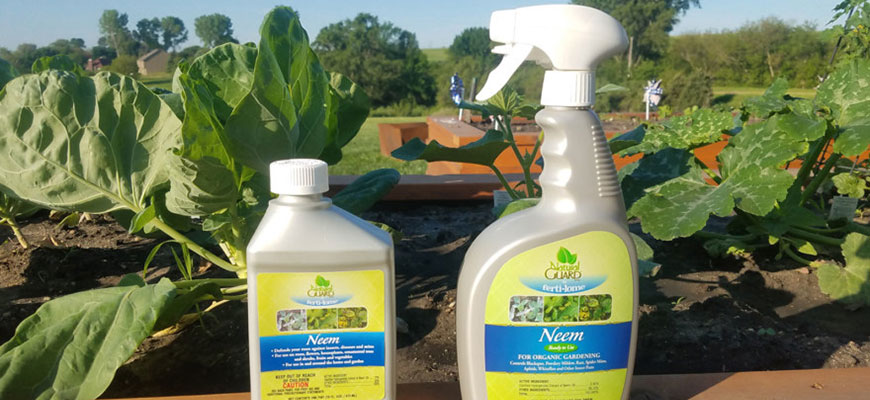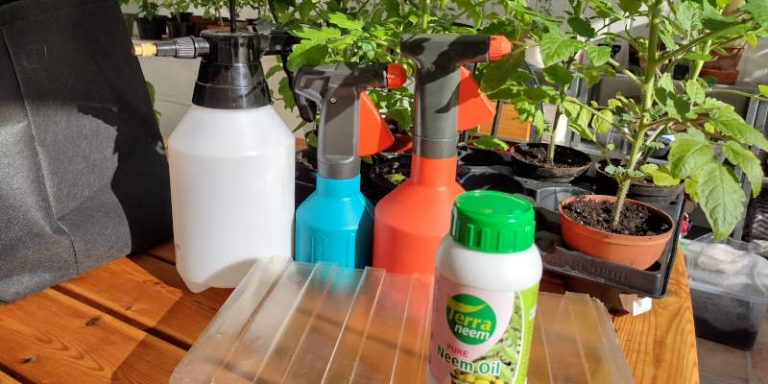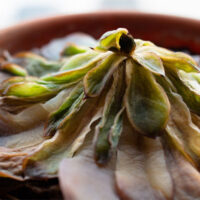As natural insecticides become more popular, many growers are keen to learn how to use neem oil to treat spider mites. Neem oil is an extract of the neem tree. Fruits, seeds, and other tree parts are cold-pressed to make this popular horticultural oil. Gardeners often use neem oil to combat spider mites because it contains a variety of active chemicals in its raw state, including azadirachtin.
Below, you will find a complete guide on using neem oil to kill spider mites.
Table of Contents
Are Spider Mites Really That Bad?
What makes spiders a major garden pest is their ability to reproduce exponentially. Within a few days of hatching, a female spider can lay 8-20 eggs per day and live up to 3 weeks. This means that a single female spider if left undisturbed, could theoretically produce more than 300 eggs by the end of her life. For plant lovers, that’s a scary statistic.
Not only do spider mites reproduce rapidly, but they also attack more than 200 plant species and have the ability to quickly spread from one plant to another, and from property to property.
This suggests that you have to start attacking spiders the moment you see them. Killing 1 spider is easy. Killing thousands requires more time and attention.
What’s Neem Oil?

Neem oil comes from the seeds of the neem tree. Neem, a distant relative of rosewood, grows rapidly, and although they originated in India and Southeast Asia, they can now be found in Asia, Africa, and South America.
These trees produce grape-like green edible fruits whose seeds, when harvested, dried, and pressed, produce an oil that has both medicinal and insecticidal value.
Does Neem Oil Kill Spider Mites?
Neem oil is a highly effective spider insecticide that is easy to use. Control spider populations with neem oil, a natural, organic insecticide that won’t harm plants or beneficial insects.
The larvae and adults are smothered by neem oil, which clings to plant leaves. When spiders encounter neem oil, the bioactive components react with the spider’s digestive and reproductive systems, killing them.
Why Should I Use Neem Oil?
Neem oil is an effective insecticide for two main reasons:
First, the neem tree produces a natural compound called azadirachtin in its seeds. Azadirachtin is biodegradable and virtually non-toxic to humans and pets, but it can cause hormonal problems in a variety of insects, preventing them from completing their life cycles.
Second, when insects are attacked with a neem oil spray, the insects are covered with a slight oily film that hinders their function. Depending on their stress resistance, this alone can kill a wide variety of soft-bodied pests. It also kills bugs, such as leaf-footed and squash bugs, when the bugs are in their nymphal stage, and therefore do not yet have an adult exoskeleton.
A side benefit of spraying spider mite-infested plants with neem oil is its bactericidal properties. It breaks down quickly in the sun – it can damage the foliage of plants if used in the morning and early afternoon when the weather is hot – but there is evidence that it may be effective against plant blight, powdery mildew and other Fungal diseases help.
When Should I Apply Neem Oil?
If you’re going to spray neem oil on your plants, you need to be very careful and thoughtful about when, how, and how often to apply it.
Neem oil should be used in the late afternoon or early evening, usually between 6:00 pm and 8:00 pm. If applied too early in the day, the oil can damage the leaves of the plant. If applied too late, visibility will be limited, increasing the chance of misapplying.
I prefer spraying the plants with neem oil as late in the day as possible while still taking advantage of the visibility, which means I can’t recommend setting the time as the sun will set at different times depending on the season and geography.
But it’s easy to figure it out on your own. Just make a note of when the sun goes down and set off an alarm 30 minutes in advance to remind you to get outside and spray your plants before it gets dark.
Don’t underestimate the importance of alerts, especially when you’re battling spider infestations. If you miss an application, you’re just giving the spider more chances to reproduce and continue to destroy your plants.
How Do I Apply Neem Oil?

When it comes to spiders, a neem oil spray will only work in direct contact with pests. In other words, you have to spray them on, so you can disrupt their biological and hormonal systems.
Unlike diatomaceous earth, neem oil dries out within a few hours, which is why repeated applications are required to control spider infestations. Diatomaceous earth will stay on the plant until it is washed away and can harm insects that happen to pass over or land on the plant. This is also why it is important to use it in the late afternoon or evening. By doing this, you can allow the spray to dry overnight so it won’t damage the plant when the temperature rises the next day. This isn’t really a problem when it comes to indoor houseplants; it only applies to plants that are exposed to direct sunlight.
When applying, be sure to set the sprayer nozzle to mist or cone. You don’t want to spray a neem oil spray stream that would coast some parts of the plant and miss others. Your goal is to cover the plant’s leaves as completely and evenly as possible.
To achieve this, you must spray the tops and bottoms of all leaves, as spider mites are notorious for sticking to the undersides of leaves and in the folds of curled leaves. As I’ve written elsewhere on this blog – an article on what spiders look like and how they spread from plant to plant – if you can’t spray all surface areas of your plants, there’s a good chance the spiders will survive the spray and continue to live and reproduce.
Now let’s be clear: unless your problem is a small factory, you won’t be able to achieve 100% coverage of all affected factories in one day. Instead, you’ll want to apply a neem oil spray regularly and thoroughly to catch any spiders that avoid early spraying sometimes within a week or two.
Pests Affected by Neem Oil
If you don’t know which pests are destroying your houseplants or garden plants, but need to start pest management right away, neem oil is a great option.
- fungus small insect
- Ant
- spider mites
- flea beetle
- powdery mildew
- other fungal diseases
Neem oil insecticide is considered harmless to beneficial insects such as bees, butterflies, and birds because it is only effective when insects eat plant leaf material. Whether you have houseplant pests or suspected carnivorous mites in your garden, neem oil is the perfect solution.
Neem oil is a versatile natural pesticide. Natural remedies such as neem oil are increasingly used to treat pests such as spider mites, and powdery mildew and more gardeners are interested in preventing dangerous chemicals from entering flowers and food. more.
Before applying the neem oil mixture to the entire plant, be sure to test it on a small part of the plant, such as the underside of a leaf. Some plants, such as cherry blossoms, spruce, hibiscus, and cedar, are sensitive to neem oil and do not tolerate it well.
Conclusion
Overall, neem oil kills a wide variety of insects, so you’ll want to be careful spraying your plants in the early evening when pollinators aren’t as active during the day.
Neem oil sprays are most effective against soft-bodied pests such as aphids, cucumber beetles, mosquitoes, grubs, mealybugs, thrips, whiteflies, and various nymphs.
While it doesn’t usually kill bees, it can incapacitate other beneficial pollinators, such as butterflies and moths. I’ve seen some people claim that neem oil spray kills squash bugs, bed bugs, and even leaf-footed bugs, but in my experience, it’s largely ineffective against these insects unless they’re in their nymph stages.

















